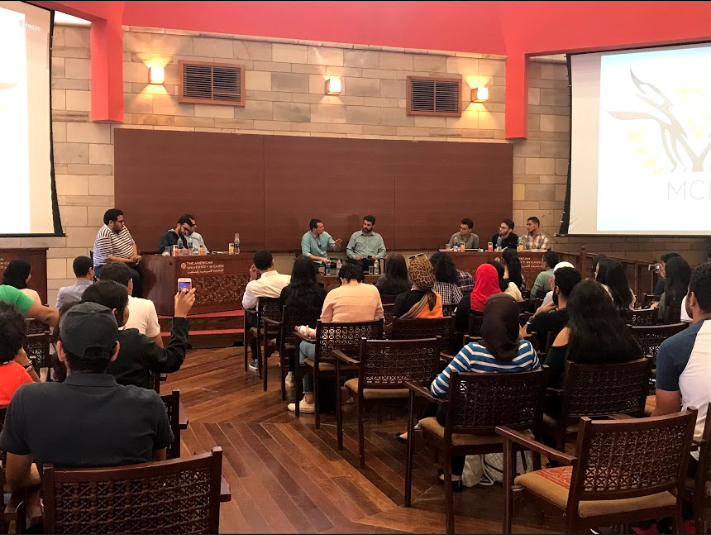MCM Debate Questions Whether Politics and Religion Can Coexist
By: Nourane Selim
Follow @nourneselim97
AUC’s Model Council of Ministers (MCM) held its first student debate on October 12, moderated by TV Host Ramy Radwan, on the subject of the place of religion in politics.
The debate aimed to engage students in a controversial, yet critical, discussion to spread political awareness.
“We believe that this is one of the major problems present in our country. Should religion be integrated into politics? And if so, to what extent?” MCM President Ahmed Waleed said.
Students had to pass through three phases to make one of the two competing teams: the ‘affirmative’ team, arguing in favor of integration; and the ‘negative team’, arguing in favor of secularization.
MCM started recruiting participants through an online campaign which garnered 50 signups.
Students were then interviewed to assess their knowledge about the topic, and their presentation and interactive skills.
This was followed by the elimination phase, where 50 students were shortlisted to six, with three on each team.
The main argument made by the affirmative team revolved around the success achieved as a result of integrating religion into politics, using Turkey as an example.
However, the negative team were quick to point out the contradiction in the opponent’s argument by claiming that Turkey’s economy has been declining over the past few years.
In addition, they asked the opposing team, which religion would you choose to integrate in Egypt? To what extent would you integrate it into politics? And how are you going to deal with people from other religions?
Those questions were left unanswered by the affirmative team.
Radwan found that each team member was able to voice their opinion, which made the debate quite engaging.
“There was room for a lot of discussions and questions that I personally could have asked but decided to leave for the students to see their own potential,” he told The Caravan.
However, he said that both teams could have given more detailed examples that would have supported their arguments, particularly with regards to the affirmative team.
Each of the participants had a distinct reason for joining the debate — Abdurrahman Radwan, a freshman on the affirmative team, was willing to undertake new challenges.
While he found the debate to be well organized, he believes it required more marketing.
“We also did not have enough time. One hour is definitely not enough to cover such a rich and important topic.”
Ziad Dakroury, a sophomore member on the negative team, took part in order to argue for what he strongly believes in.
“The opposing team did not answer any of my questions and sometimes I wasn’t allowed to clarify my point due to time restrictions, which left me dissatisfied.”
Members of the audience were also heavily engaged throughout the event, especially when it came to deciding on a winning team.
Ahmed Farrag, an economics graduating senior, was one to experience a change of heart — once a supporter of the merger of religion and politics, he left the debate more convinced with the opposing view.
The audience got the chance to vote for the winning team during the debate: the against team won 150 points, with the other team scoring 75 points, – a surprising outcome.
Meanwhile, Adjunct Ashraf El-Sherif said that religion and politics are usually inseparable as long as politics is a process of an authoritative allocation of values and meaning.
However, he believes that it all depends on the type of integration and whether it gears towards a progressive and healthy functioning of society or the opposite.
The history of secularism in Egypt has been complex and wavering, with its first appearance occuring under the British Occupation.
Religion has become a key component of modern Egyptian identity.
It is reinforced by the state, which considers itself its exclusive guardian and the representative of Islam, El-Sherif added.



